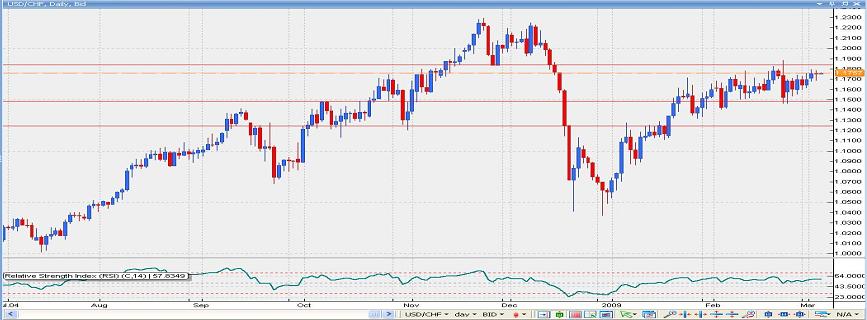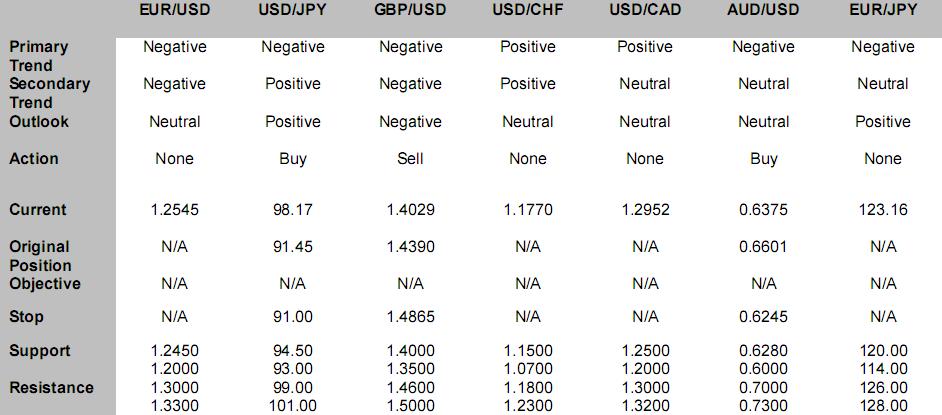USD/CHF Little Changed on Swiss Recession
* The dollar was little changed against most major currencies on Tuesday. US stocks closed modestly lower, trying to find support. US pending home sales fell much more than expected. Federal Reserve Chairman Ben S. Bernanke and Treasury Secretary Timothy Geithner warned policy makers may need to expand aid to the banking system beyond the $700 billion already approved. The yen was pressured by reports Toyota may ask for government assistance and by Bank of Japan Governor Masaaki Shirakawa’s comment that the Japanese economy is worsening faster than the BOJ expected. The euro fell modestly on safe haven outflows, pressured by the worsening outlook for the financial sector. Sterling was little changed, trying to find support at the 1.40 handle. UK Chancellor of the Exchequer Alistair Darling suggested the Bank of England could start printing money as soon as this week to avoid the liquidity trap as the policy rate is approaching zero. The Canadian dollar traded near yearly lows after the Bank of Canada cut its benchmark interest rate to 0.50%, the lowest ever, and said it is preparing to use unconventional easing policies to stimulate the economy. The Australia dollar, today’s star performer, rose after the Reserve Bank of Australia unexpectedly kept its key rate unchanged at 3.25%.
* The USD/CHF was little changed. Switzerland’s economy contracted by the most since 2004 in Q4 2008, entering its first recession, measured by two consecutive quarters of decline, since Q1 2003, as exports fell and companies slashed spending. The pair is supported by risk aversion and global banks’ dire situation. Switzerland has an unproportional large share of global banks and will not be able to bail out its oversized banking sector, if needed. This makes the Swiss franc vulnerable to further deterioration in the banking sector. The pair has lost momentum and looked like it is rolling over. However, more problems for the banks would change that. There are resistance in the 1.18 area and support in the 1.15 area.

www.cmsfx.com
Financial and Economic News and Comments
US & Canada
* US pending home sales slumped more than twice as much as was expected in January, with the NAR US pending home sales index falling 7.7% m/m to 80.4, the lowest level since records began in 2001, following a downwardly revised 4.8% m/m increase in December, data from the National Association of Realtors showed. Pending home sales fell 6.4% y/y.
www.cmsfx.com
* The Bank of Canada cut its key interest rate 50 basis points to 0.50%, the lowest level, saying it is preparing to use quantitative easing if needed to counter the recession. “The bank is refining the approach it would take to provide additional monetary stimulus, if required, through credit and quantitative easing,” the BOC said in a statement. The BOC said Canada’s GDP will contract faster than estimated in January. BOC Governor Mark Carney signaled he may cut the benchmark rate further. “The target for the overnight rate can be expected to remain at this level or lower at least until there are clear signs that excess supply in the economy is being taken up,” the BOC said, adding that supply may not begin to be taken up “until early 2010.”
Europe
* Switzerland’s economy has officially entered its first technical recession since Q1 2003 after posting its second consecutive quarter of negative economic growth in Q4 2008, the Swiss Federal Statistical Office said. The Q4 Swiss GDP contracted a less-than-expected 0.3% q/q, led by negative export growth, following Q3’s downwardly revised 0.1% q/q decline. Exports dropped 8.1% q/q in Q4 after a 0.3% q/q increase in Q3, while imports fell 5.8% q/q. Investment levels declined 3.1% q/q. Consumption increased 0.2% q/q, while government expenditure slowed to 0.7% q/q. The Q4 GDP contracted a more-than-expected 0.6% y/y, following Q3’s downwardly revised 1.4% y/y gain. Given the deteriorating growth outlook, the Swiss National Bank may adopt unconventional measures to counter the recessionary economy as the key interest rate remains near zero.
www.cmsfx.com
* German wholesale prices declined 0.4% m/m in January, after a 3.2% m/m slide in December, the Federal Statistical Office reported. Wholesale prices dropped 5.9% y/y, the largest decline since March 1987, following December’s 4.2% y/y fall.
* UK building activity continued to deteriorate in February, with the UK construction PMI plunging more than expected to a record low of 27.8 from January’s 34.5, according to the Chartered Institute of Purchasing and Supply. Meanwhile, a separate report showed the UK Treasury plans to spend £13 billion in government sponsored building projects to revive the UK housing sector.
Asia-Pacific
* The Reserve Bank of Australia unexpectedly left the cash rate unchanged at 3.25%, saying the recent sharp rate cuts and almost A$88 billion ($56 billion) government spending are helping the Australian economy. RBA Governor Glenn Stevens said in a statement: “The Australian economy has not experienced the sort of large contraction seen elsewhere. The Australian financial system remains strong and the monetary policy transmission process is working to deliver large reductions in interest rates to end borrowers. Nonetheless, economic conditions are clearly weak, and given the speed and scale of the global economic deterioration and its effect on confidence, weak conditions are likely to continue in the near term. Inflation is likely to decline over time. In response to that outlook, there has already been a major change in both monetary and fiscal policy. Market and mortgage rates are at very low levels by historical standards and business loan rates are below recent averages, reducing debt-servicing burdens considerably. Together with the substantial fiscal initiatives, the cumulative decline in interest rates will provide significant support to domestic demand over the period ahead.”
* Australia’s current-account deficit narrowed more than expected to A$6.49 billion ($4 billion) in Q4 2008, on surging coal exports, from a revised A$9.47 billion in Q3, according to the Australian Bureau of Statistics (ABS).
* Australian retail sales unexpectedly increased a seasonally adjusted 0.2% m/m in January, led by clothing and food sales, following a 3.8% m/m gain in December, the most in eight years, the ABS reported.
* Commodity sales may drop for the first time in six years, projected to fall 17% from a record to A$162 billion ($102 billion) in the 12 months ending June 30, 2010, compared with a revised forecast of A$196 billion for the 2009 fiscal year, the Australian Bureau of Agricultural and Resource Economics reported. Global economic growth will decline to 0.6% in 2009, before a recovery in China and India helps lift growth to 3.0% in 2010, spurring demand for Australia’s commodity exports, the bureau said.
FX Strategy Update

©2004-2008 Globicus International, Inc. and Capital Market Services, L.L.C.
Source: Hans Nilsson
03.03.2009



 Currency Charts
Currency Charts